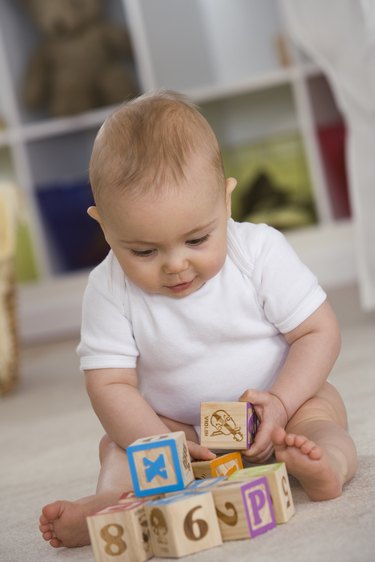
A 10-month-old infant generally consumes a diet of breast milk or cow milk based formula along with solid foods. You should feed on demand and trust your baby to eat the right amount, according to the United States Department of Education. Your baby will show you when she is hungry. You can monitor the exact amount your baby consumes if you are feeding her formula or if you are using a pump and putting breast milk in bottles.
Identification
Video of the Day
Crying is a sign of hunger, but a late one. Rooting, lip-smacking, sucking motions and putting hands to the mouth are other behavioral cues, according to Baby Center. If your baby finishes a bottle and immediately looks around, for more, he is telling you he is still hungry. In that case, Baby Center recommends offering just an additional ounce or so to avoid waste.
Video of the Day
Time Frame
Age is important to consider when determining how much to feed your baby, since nutritional needs evolve with time. The general trend, as the months past, is fewer bottles per day but with more formula or breast milk, according to Baby Center. Newborns eat every two to three hours, 1 to 4 ounces each. At age 10 months, three to four bottles per day, containing 7 to 8 ounces each, is typical.
Success Signs
A well-fed baby will seem content and relaxed after eating. He will also produce five to six wet diapers per day if you are using disposables, and six to eight if you depend on cloth diapers, since they hold a bit less, according to Baby Center. Continual weight gain is another important sign.
Expert Insight
Ten-month-old babies can have dairy in foods but should not drink whole milk, Dr. Greg Germain, a pediatrician in New Haven, Connecticut, writes at Baby Zone. At age 1 year, children can transition to whole milk and solid meals. Before that, their digestive systems are not mature enough to handle the protein in whole milk. The result can be irritation and chronic, low-grade bleeding of the intestinal tract, leading to anemia.
Warning
Crying can have several causes other than hunger. Examples, according to Kids Health, are wet diapers, over-stimulation, a need for cuddling and being too hot or too cold. If you are too quick to offer a bottle each time you hear crying, you might end up overfeeding. Results can be stomach pain and vomiting.